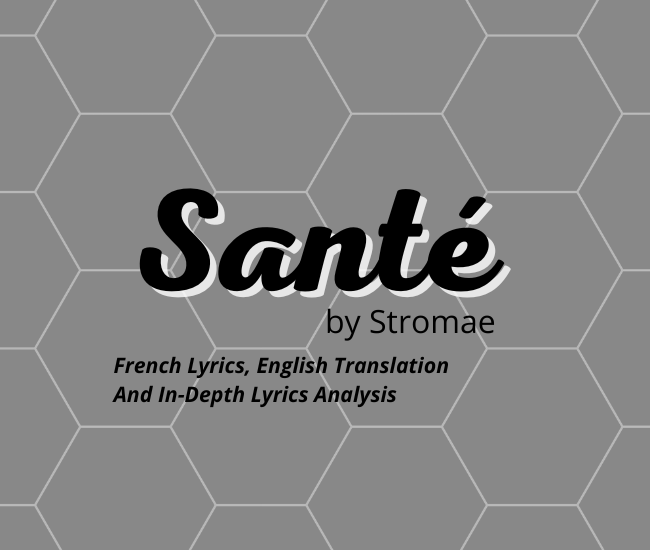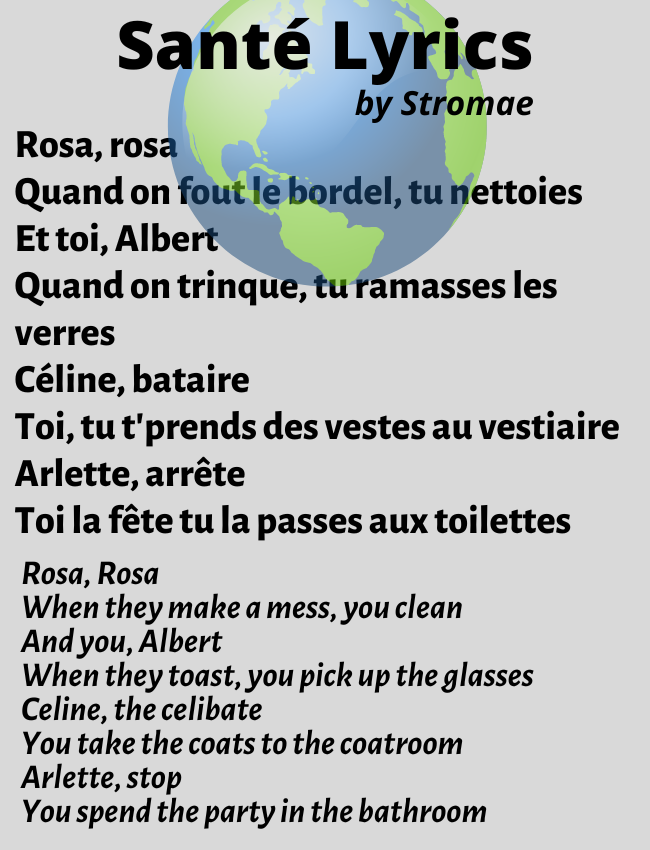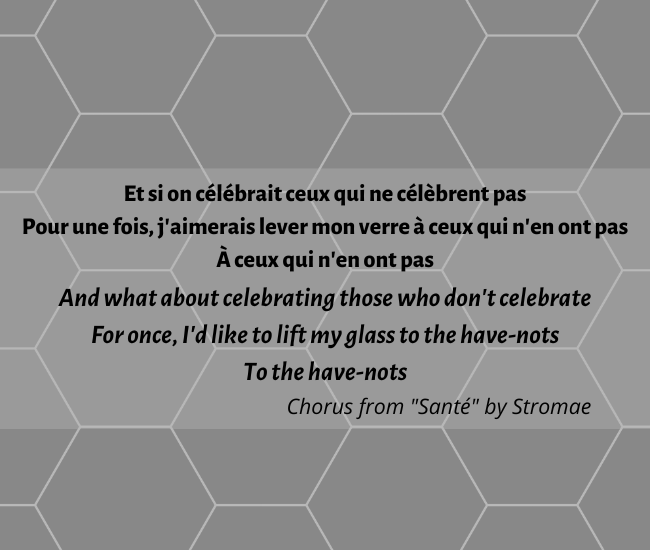Santé (Pronunciation: sɑ̃te; Meaning: cheers) is a hit French song released by Belgian singer Stromae in 2021 on the album Multitude. The song’s aim is to pay homage to the world’s average, everyday people and workers. This post was written for non-French speakers who take an interest in Stromae’s music and want to delve deep in the meaning of the lyrics.

Become an expert in French song lyrics!
One of the most effective ways to learn French is by studying song lyrics. For Stromae, we have analyzed the lyrics of the following hit songs: “L’enfer“, “Alors On Danse“, “Papaoutai” and “Formidable“. Indila is a leading French female singer. We’ve analyzed the lyrics of the following songs by Indila: “Ainsi Bas La Vida“, “Dernière Danse“, “Tourner Dans Le Vide” and “Love Story“. Edith Piaf is arguably the greatest French singer of all time. We’ve analyzed the following Edith Piaf songs: “La Vie En Rose“, “Non, Je Ne Regrette Rien“, “Sous Le Ciel De Paris“, “Mon Dieu” and “Milord“.
Santé – Song synopsis and song title meaning
In the song Santé, Stromae seeks to honor and show appreciation for average people in everyday positions in this world who normally would not get recognition.
The title of the song, “santé”, in French means both “health” and “cheers”. The song has this title because Stromae is suggesting that we raise our glasses to cheer the have-nots of this world (j’aimerais lever mon verre à ceux qui n’en ont pas; I’d like to lift my glass to the have-nots).
In the beginning of the song, Stromae states the names of individuals who do seemingly banal jobs. For example, He sings “Rosa – Quand on fout le bordel, tu nettoies; When they make a mess, you clean).
By the end of the song, Stromae goes down a list of professions (Pilotes d’avion ou infirmières; Airplane pilots or nurses) and suggests that we “celebrate those who don’t celebrate” (célébrons ceux qui ne célèbrent pas).
In the song’s video (see end of post), people in various ‘everyday’ roles are shown from all of the world including people in Africa, Russia and southeast Asia. By the end of the video you can see the people dancing and celebrating.

Lyrics analysis
In the following the section we’ve examined each line of Santé and highlighted both vocabulary and grammar rules of interest.
À ceux qui n’en ont pas
The first line of the song is actually quite complex grammatically.
We translated this line to “To the have-nots”. The literal translation of the line is “to those who don’t have it”, and this is the translation that can be found on most other websites.
According to Oxford Languages, a “have-not” is defined as “economically disadvantaged people”, and paying homage to these people really is the theme of the song.
The French preposition à translation to “to” can be used in making a toast. For example, “À Martin!” (to Martin!). The word “ceux” means “those” and is a demonstrative pronoun.
The word “qui” in this line is a relative pronoun means “that”. “Ont” is the third-person plural form of the verb “avoir” (to have).
The ne…pas part of the line is the most standard form of French negation. “En” is a relative pronoun meaning “it”, “some” or “them” and is used for verbs followed by “de”. This page on Frenchtoday.com explains how to use “en”.
Rosa, Rosa, Quand on fout le bordel, tu nettoies
This line translates to “Rosa, Rosa, When they make a mess, you clean”. The French personal pronoun “on” has several translations and usages including “one”, “we” and “people in general”.
“Fout” comes from the verb “foutre“, which is slang word for “faire” (to make, to do). The expression, “foutre le bordel“, literally “to make the brothel”, means “to make a mess” or “to mess around”.
The verb “nettoyer“ means “to clean”.
Et toi, Albert, Quand on trinque, tu ramasses les verres
These lines translate to “And you, Albert, When they toast, you pick up the glasses”. The word “toi” is a stressed pronoun and means “you” in French.
The verb “trinquer“ means “to make a toast” or “to clink glasses”. The verb “ramasser“ means “to pick up” or “to gether” and “verre” means glass.
Céline, bataire, Toi, tu t’prends des vestes au vestiaire
These lines translate to “Céline, the celibate, You take the coats to the coatroom”. “Céline, bataire” is a play on words on the word “célibataire”, meaning “single” or “unmarried”.
“Tu te prends” translates to “you take yourself”. We’re not sure why Stromae uses a reflexive verb in this line. “Tu prends des vestes au vestiaire” means “you take the coats to the coatroom.
Arlette, arrête, Toi la fête tu la passes aux toilettes
These lines translate to “Arlette, stop, You spend the party in the bathroom”. The verb “arrêter” means “to stop”. The verb “passer“ has several translations and usages. In the context of this line it means “to spend (time)”.
Et si on célébrait ceux qui ne célèbrent pas
This line translates to “And what about celebrating those who don’t celebrate” and is the first line of the song’s chorus.
The construction “si + on + imperfect tense“ means “What about + verb”. Hence, “Si on célébrait” means “what about celebrating”.
Pour une fois, j’aimerais lever mon verre à ceux qui n’en ont pas
This line translates to “For once, I’d like to lift my glass to the have-nots”. The word “fois” means “time” in the sense of “how many times”. The other word for “time” in French is “temps”, which is used in the context of “having the time”. This page compares temps vs. fois.
“Aimerais” is the first-person singular (je, meaning “I”) form of the verb “aimer” (to like, to love) in the French conditional tense, which is used to express “would” and hypothetical situations. Hence, “J’aimerais” means “I would like”. When making requests, “je voudrais“ also means “I would like”.
The verb “lever” means “to raise”, “to raise up” or “to lift”.
Quoi les bonnes manières?
This line translates to “What, good manners?”. The word “quoi” means what and can be seen as somewhat informal. This page covers “quoi“ in detail.
Pourquoi j’f’rais semblant?
This line translates to “Why would I pretend?”. “J’f’rais” is a shortening of “Je ferais” which is “faire” (to make, to do) in the conditional tense. “Pourquoi“ means “why” and the expression “faire semblant“ means “to pretend”.
Toute façon elle est payée pour le faire
This line translates to “Anyhow she’s paid to do it”. “Toute façon” is a shortening of the expression “de toute façon“, which means “anyway” or “anyhow”.
“Elle est” is the third-person singular (il/elle/on= he/she/one) form of the verb “être” (to be). The word “pour” means “for” and has several usages. When preceding an infinitive of a verb (the verb’s ‘to’ form), “pour” translates to “for” or “in order to”.
The “le” in this line is a direct object pronoun meaning “it”.
Tu t’prends pour ma mère?
This line translate to “You think you’re my mom?. The expression, “se prendre pour” means “to believe yourself to be”. “Ma” in this line is a possessive adjective and means “my” when followed by a feminine noun. “Mère” translates to “mother”. This page covers French family vocabulary.
Dans une heure j’reviens, qu’ce soit propre
This line translates to “I’ll be back in an hour, it better be clean”. “Dans” means “in” when used in the context of “in how much time”. “Heure” means “hour” and is an essential word to know for telling time.
“Revenir“ means “to come back” or “to return”. “Qu’ce soit propre” translates literally to “that this be clean” and loosely to “it had better be clean”. This is the verb “être” in the subjunctive mood.
Qu’on puisse y manger par terre
This line translates to “Qu’on puisse y manger par terre”. “Puisse” is the verb “pouvoir“ (can, to be able) in the subjunctive mood. “Y” means “there and “par terre“ means “on the ground” or “on the floor”.
Trois heures que j’attends, franchement
This line translates to “I’ve been waiting for three hours, honestly”. The line is omitting the words “Ça fait” (it’s been). The entire construction, “Ça fait trois heures que j’atttends” means “I’ve been waiting for three hours”.
Another way to write this sentence is with “depuis“, which translates literally to “since”. Hence, “J’attends depuis trois heures” has the same meaning.
“Franchement“ means “frankly” or “honestly”. Another French synonym is “sincèrement“.
Il les fabrique ou quoi?
This line translates to “Is he making them or what?”. “Fabriquer” means “to make”, “to manufacture” or “to produce”. The “les” in this line is a direct object pronoun and means “them”. “Les” is also the definite article, meaning the plural form of “the”.
Heureusement qu’c’est que deux verres
This line translates to “Luckily it’s just two glasses”. “Heureusement” (literally happily) means fortunately or luckily. “C’est que” is a shortening of “ce n’est que” meaning “it’s only”.
Appelle-moi ton responsable
This line translates to “Call me your supervisor”. The verb “appeler“ means “to call”. In the imperative (tense for commands) form, “Appelle-moi” means “call me”. This page covers various ways of saying “me” in French.
The word “responsable“ looks like English adjective “responsible”. However, in French the noun “responsable” means “supervisor” or “manager” in a work setting.
Et fais vite, elle pourrait se finir comme ça ta carrière
This line translates to “And do it quickly, you’re career could finish like that”. “Vite” means “quickly” or “fast”. The word “elle” (she) in this line is referring to the feminine noun “carrière” (career).
Frotter, frotter, Mieux vaut ne pas s’y, Si tu n’me connais pas
These three lines lines translate to “Rub me the wrong way, Better not, if you don’t know me”. Because the “s'” is followed by the object pronoun “y”, we deduct that complete form of “frotter“ (to rub) is “se frotter à”, which means either “to rub somebody the wrong way” or “to mix or rub shoulders with”.
The impersonal expression, “mieux vaut” or more formally “il vaut mieux“ means “it’s best to”.
Brosser, brosser, Tu pourras toujours te, Brosser, brosser, Si tu ne me respectes pas
These lines translate to “Brush, brush, You can always rub yourself the wrong way , If you don’t respect me”. In this line, Stromae appears to be doing a play on words as “brosser“ (to brush) is synonymous with the previous lines’ “frotter”.
Hence, “Tu pourras toujours te brosser” could mean “you could rub yourself the wrong way”. “Pourras” is the second-person singular (tu) form of “pouvoir” (can, to be able).
“Si tu ne me respectes pas” means “if you don’t respect me”. “Si“ means “if” in French. The word “si” is another way of saying “yes” in French when replying affirmatively to something that’s just been stated in the negation.
Oui, célébrons ceux qui ne célèbrent pas
This line translations to “Yes, let’s celebrate those who don’t celebrate”. In this line “célébrons” is the imperative form of “célébrer” (to celebrate), meaning “let’s celebrate”.
Encore une fois, j’aimerais lever mon verre à ceux qui n’en ont pas
This line translates to “One more time, I’d like to lift my glass to the have-nots”. The word “encore“ has several meanings and usages including “again”, “yet” and “still”. The translation for the context of this line “one more”.
Pilotes d’avion ou infirmières, Chauffeurs de camion, hôtesses de l’air, Boulangers ou marins-pêcheurs
These three lines translate to “Airplane pilots or nurses, Truck drivers, flight attendants, Bakers or fishermen”. In these lines, Stromae is emphasizing that he’d like to raise his glass to and celebrate people who are in what are considered banal professions and job positions.
Un verre aux champions des pires horaires
This line translates to “A glass to the champions of the worst hours”. Again, Stromae is bringing attention to people in thankless jobs who perhaps work long shifts at undesirable hours.
Aux jeunes parents bercés par les pleurs
This line translates to “To the young parents lulled by the crying”. The verb “bercer“ means “to rock”, “to cradle”, “to lull” and “to soothe”. Here, Stromae is paying homage to the often thankless task of parenting.
Aux insomniaques de profession, Et tous ceux qui souffrent de peines de cœur
These two lines translate to “To insomniacs by trade, To all who suffer from heartache”. In this line, be believe that Stromae is referring to people who simply struggle emotionally in general.
Qui n’ont pas le cœur aux célébrations
This line translates to “Who don’t have the heart to celebrate”. In the end, through the song, “Santé”, Stromae is paying respect to all those who struggle and really can’t celebrate life.

Strome Santé – French Lyrics & English Translation
À ceux qui n’en ont pas
À ceux qui n’en ont pas
To the have-nots
To the have-nots
Rosa, rosa
Quand on fout le bordel, tu nettoies
Et toi, Albert
Quand on trinque, tu ramasses les verres
Céline, bataire
Toi, tu t’prends des vestes au vestiaire
Arlette, arrête
Toi la fête tu la passes aux toilettes
Rosa, Rosa
When they make a mess, you clean
And you, Albert
When they toast, you pick up the glasses
Celine, the celibate
You take the coats to the coatroom
Arlette, stop
You spend the party in the bathroom
Et si on célébrait ceux qui ne célèbrent pas
Pour une fois, j’aimerais lever mon verre à ceux qui n’en ont pas
À ceux qui n’en ont pas
And what about celebrating those who don’t celebrate
For once, I’d like to lift my glass to the have-nots
To the have-nots
Quoi les bonnes manières?
Pourquoi j’f’rais semblant?
Toute façon elle est payée pour le faire
Tu t’prends pour ma mère?
Dans une heure j’reviens, qu’ce soit propre
Qu’on puisse y manger par terre
Trois heures que j’attends, franchement
Il les fabrique ou quoi?
Heureusement qu’c’est que deux verres
Appelle-moi ton responsable
Et fais vite, elle pourrait se finir comme ça ta carrière
What, good manners?
Why would I pretend?
Anyhow she’s paid to do it
You think you’re my mom?
I’ll be back in an hour, it had better be clean
So we can eat on the ground
I’ve been waiting for three hours, honestly
Is he making them or what?
Luckily it’s just two glasses
Call me your supervisor
And do it quickly, you’re career could finish like that
Et si on célébrait ceux qui ne célèbrent pas
Pour une fois, j’aimerais lever mon verre à ceux qui n’en ont pas
À ceux qui n’en ont pas
And if we celebrated for those who don’t celebrate
For once, I’d like to lift my glass to the have-nots
To the have-nots
À ceux qui n’en ont pas
To the have-nots
Frotter, frotter
Mieux vaut ne pas s’y
Frotter, frotter
Si tu n’me connais pas
Brosser, brosser
Tu pourras toujours te
Brosser, brosser
Si tu ne me respectes pas
Rub me the wrong way
Better not
Rub me the wrong way
If you don’t know me
Brush, brush
You can always
Rub yourself the wrong way
If you don’t respect me
Oui, célébrons ceux qui ne célèbrent pas
Encore une fois, j’aimerais lever mon verre à ceux qui n’en ont pas
À ceux qui n’en ont pas
Yes, let’s celebrate those who don’t celebrate
One more time, I’d like to lift my glass to the have-nots
To the have-nots
Pilotes d’avion ou infirmières
Chauffeurs de camion, hôtesses de l’air
Boulangers ou marins-pêcheurs
Un verre aux champions des pires horaires
Aux jeunes parents bercés par les pleurs
Aux insomniaques de profession
Et tous ceux qui souffrent de peines de cœur
Qui n’ont pas le cœur aux célébrations
Airplane pilots or nurses
Truck drivers, flight attendants
Bakers or fishermen
A glass to the champions of the worst hours
To the young parents lulled by the cries
To insomniacs by trade
To all who suffer from heartache
Who don’t have the heart to celebrate
Qui n’ont pas le cœur aux célébrations
Who don’t have the heart to celebrate
Listen to Santé on YouTube & Spotify
The official video for Santé has over 42 million views on YouTube.
You can also listen on Spotify:
